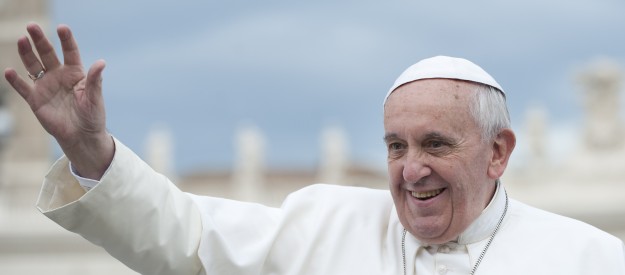"We are losing our attitude of wonder, of contemplation, of listening to creation and thus we no longer manage to interpret within it what Benedict XVI calls 'the rhythm of the love-story between God and man.'"
+ Pope Francis
Is Francis sending signals?

Is Pope Francis offering clues to his upcoming environmental encyclical?
His words last weekend in Caserta and the inclusion of ecology in his ten steps to happiness were provocative, wonderful, and for the most part unexpected. But what can we learn from them?
Let’s start with his statements in Caserta on the Feast of St. Anne and Joachim—a special moment for me as my Italian family is from the Caserta region and my mom was named after St. Anne.
Giving primacy to God means having the courage to say no to evil, violence, oppression, living instead a life of service to others and in favor of the law and the common good. When a person finds God, the true treasure, they leave a selfish lifestyle and look to share with others the love that comes from God. Whoever becomes a friend of God loves his brothers, is committed to safeguarding their lives and their health, also respecting the environment and nature. I know that you suffer for these things. Today, when I arrived, one of you has approached me and said: Father, give us hope. But I cannot give you hope, I can tell you that where Jesus is, there is hope; where there is Jesus, each person loves all other persons like brothers, committed to safeguarding their lives and their health and also respecting the environment and nature. This is the hope which never disappoints, the one that Jesus gives! This is particularly important in your beautiful land that needs to be protected and preserved. It requires you to have the courage to say no to any form of corruption and lawlessness, it requires everyone to be servants of the truth and to assume every situation in the style of the living Gospel, which is manifested in the gift of self and attention to the poor and the excluded.
And then there are these words from his interview last week with the Argentinian weekly “Viva,” as reported by Vatican Radio.
"When, for example, you want to make use of a mining method that extracts more than other methods, but it contaminates the water, it doesn’t matter,” he said. “And so they go on contaminating nature. I think it's a question that we do not face: humanity, in the indiscriminate use and tyranny over nature, is it committing suicide?"
Powerful stuff. And in them are important takeaways during these months waiting for an eco-encyclical. Here are five that I consider the most important. (Please share yours in the comments.)
The Dignity of the Human Person: First, notice how easily the Holy Father weaves his ecological messages into concerns over basic human dignity. While he does not use the term “human ecology”—which was baptized by St. John Paul II and unpacked by Benedict XVI—he does continue the conversation by speaking of ecology along with the cry for hope and the safeguarding of human health, life, and the beauty of the world.
Truth. Francis not only accepts the existence of truth as something that is true, but he expects us to embrace and live by it.
Sin: Francis places words like selfishness, corruption, and lawlessness—all the consequences and causes of sin—in opposition to life, hope, and healthy ecosystems. These attributes find themselves as the antitheses to ecological protection—the reasons why we are damaging the world around us and perhaps even “committing suicide.” Note to Catholic ecologists: Never forget to speak of sin.
The Primacy of God: The answer to sin and the source of all that we seek comes only from God. This one sentence in Caserta will probably be one of my top ten statements ever by Pope Francis: “Giving primacy to God means having the courage to say no to evil, violence, oppression, living instead a life of service to others and in favor of the law and the common good.” This about sums up the work of the Church in the world, and we forget or ignore it at our peril. Thank you Pope Francis.
None of this is theoretical: And lastly, the pope’s words to the Argentinian magazine remind us that when the Church speaks about ecology she is not speaking in abstractions. The Holy Father’s words—which call attention to fossil fuel extraction processes like hydraulic fracking—tell us that a future encyclical will demonstrate how the primacy of God, the realities of truth and sin, and the dignity of the human person all speak to real-world issues and choices that we make as consumers, and that governments and businesses make for us. Without a proper understanding of our relationship with God and each other, our choices will foster a culture that leads to our death. (In one way or another, this is always the case when speaking of sin.) Again, as Pope Francis calls us to consider, we could very well be committing suicide.
All of this brings us to these words by Pope Francis, which also deserve repeating. They really are so very important:
“Whoever becomes a friend of God loves his brothers, is committed to safeguarding their lives and their health, also respecting the environment and nature.”
May God bless and protect Pope Francis, and may his pontificate last for a great many years to come!


















